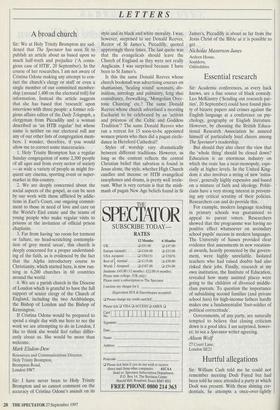Essential research
Sir: Academic conferences, as every hack knows, are a fine source of black comedy. Leo McKinstry (`Sending out research par- ties', 20 September) could have found plen- ty of bizarre papers and crimes against the English language at a conference on psy- chology, geography or English literature. However, by choosing the British Educa- tional Research Association he assured himself of particularly loud cheers among The Spectator's readership.
But should they also cheer the view that the 'whole thing' should be closed down? Education is an enormous industry on which the state has a near-monopoly, espe- cially at higher levels. In the United King- dom it also involves a string of new 'initia- tives', generally highly expensive and based on a mixture of faith and ideology. Politi- cians have a very strong interest in prevent- ing any critical scrutiny of their policies. Researchers can and do provide this.
For example, modern language teaching in primary schools was guaranteed to appeal to parent voters. Researchers showed that the programme was having no positive effect whatsoever on secondary school pupils' success in modern languages. The University of Sussex provided clear evidence that assessments in new vocation- al awards, heavily promoted by the govern- ment, were highly unreliable. Isolated teachers who had raised doubts had also risked their jobs. Finally, research at my own institution, the Institute of Education, revealed how many assisted places were going to the children of divorced middle- class parents. To question the importance of subsidising second families (and private school fees) for high-income fathers hardly makes one a fundamentalist loot-soldier of political correctitude'.
Governments, of any party, are naturally tempted to believe that closing criticism down is a good idea. I am surprised, howev- er, to see a Spectator writer agreeing.
Alison Wolf
27 Court Lane, London SE21










































































 Previous page
Previous page